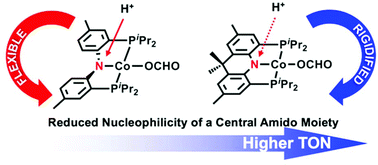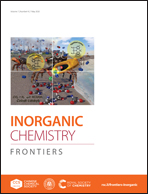Catalytic hydrogenation of CO2 at a structurally rigidified cobalt center†
Abstract
A diphosphinoamido cobalt scaffold was employed for studying catalytic CO2 hydrogenation. Particularly, the dissociative ligand loss of a cobalt catalyst induced by a formate product has been investigated. A structurally rigidified ligand leads to the reduction of the basicity of an amido moiety of a cobalt complex, thus revealing higher catalyst performance relative to the original ligand. With a robust N–Co moiety, the hydrolytic stability of the catalyst toward an accumulated conjugate acid [DBUH][OCHO] has been dramatically improved.



 Please wait while we load your content...
Please wait while we load your content...